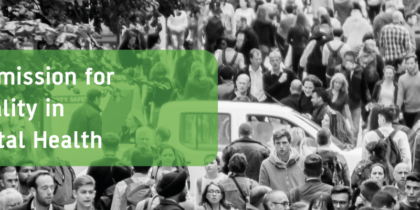In 2007, just before the global financial crash, Lord Richard Layard and myself sat around an impressive board room table in the Cabinet Office. Facing us were a small team of Treasury mandarins and Number 10 Policy Unit wonks. We were there to ask for money.
‘Well,’ said Jeremy Heywood (shortly to become Cabinet Secretary to Gordon Brown as Prime Minister), ‘I think I’ve heard enough’. He closed the meeting.
Outside on Whitehall, Richard wanted to buy me a drink to celebrate. ‘What happened?’, I asked. ‘We just got £300 million for NHS talking therapies. Not a bad morning’s work!’ he said.
Richard Layard can be credited with putting mental health firmly on the political map. Richard was the first to point out (in a lecture given at a Centre for Mental Health event back in 2005): there are more people with mental health problems on incapacity benefit than the total number of unemployed people. If we provide prompt access to evidence-based therapies, as recommended by NICE, he argued, the NHS will be able to address the primary cause of misery. In addition, by helping people back to work this investment will ‘pay for itself’. Sure enough that is what happened. In 2008, as Health Secretary, Alan Johnson launched Improving Access to Psychological Therapies (IAPT).
Neglect any one of Beveridge’s ‘Giant Evils’ and entrenched structural inequality just reinvents itself. This is what happened in the decade of austerity after the financial crash.
Around the same time, though, another solution was proposed. David Freud’s report, Reducing Dependency – the Freud Report, argued for a ‘work-first’ approach to the problem. If we support people back to work, his report argued, through DWP’s Job Centre coaches, we can directly tackle the cause of people’s misery, what he described as “chronic welfare dependency”. Lord Freud became Minister for Welfare Reform under the Coalition Government. Work Programme coaches were duly recruited to Job Centres; and later Universal Credit was launched.
Lord Layard and Lord Freud both got some things wrong. There isn’t a simple, single cause of misery. Beveridge knew this when he created the Welfare State in the great rebuilding after the Second World War. Investment is needed in education, health, housing, employment, and in social security benefits to alleviate poverty. Neglect any one of Beveridge’s ‘Giant Evils’ and entrenched structural inequality just reinvents itself. This is what happened in the decade of austerity after the financial crash. And it will happen again during an economic recession and the increased unemployment that will follow on from the global pandemic.
The Chancellor knows this. Last week he has announced another 13,500 Job Centre coaches. He has also earmarked just short of £50 million for extra careers advisers and work academies, and an extra £2 billion to help 18-24 year olds find jobs. But there is a problem. In the same week, Therese Coffey, Secretary of State for Work and Pensions, added the return of the stick to these carrots. People reliant upon benefits enjoyed a brief reprieve from ‘conditionality’ rules, as Job Centres all closed their doors in the first wave of the pandemic. Now they are faced once again with the threat of ‘sanctions, sanctions, sanctions’. Those on incapacity benefits with depression and anxiety, including those young people who are struggling with these issues, are most vulnerable. Without a joined-up employment and mental health policy, the government’s ‘build, build, build’ agenda to ‘level up’ will fail to reach the people it needs to – again.
We did get some things right before. Can we keep these and learn from what we got wrong?
Without a joined-up employment and mental health policy, the government’s ‘build, build, build’ agenda to ‘level up’ will fail to reach the people it needs to – again.
On the mental health side, we were right to prioritise choice of talking therapies that NICE recommended. When NICE publishes its updated Depression guideline in 2021 we must be ready with the funding needed to implement it fully. That will mean being willing to give more control to patients by increasing psychological literacy about which therapy works best for whom. At the same time, we must learn from what we got wrong in IAPT. Mostly, people do not benefit in any lasting way from undertaking very brief, stand-alone therapies.
On the employment support side, conversely, Lord Freud understood that it takes time for people to turn things round if they have accumulated heavy financial debts, or turned to alcohol or drugs as an escape, in addition to their long-standing depression. In Working Well in Greater Manchester, clients could have up to three years of support. But all of the progress we made, when keyworkers and dedicated talking therapists worked jointly with clients, could then be set at naught by ill-timed benefit sanctions from the Job Centre.
Jeremy Heywood recognised that if government works in silos it repeats the same mistakes because important parts of the picture fall out of view. He helped set up the joint Work and Health Unit for this reason. Likewise, out of the pandemic, calls for social care and health to be integrated may finally be heeded. On Sunday, we wished a happy 72nd birthday to our NHS. It was also the 75th anniversary of Attlee’s 1945 election victory which brought with it the post-war promise of the Welfare State. To celebrate both, we could do worse than recall words from the Irish writer, Samuel Beckett, of Waiting for Godot fame: “Ever tried. Ever failed. No Matter. Try again. Fail again. Fail better.”







